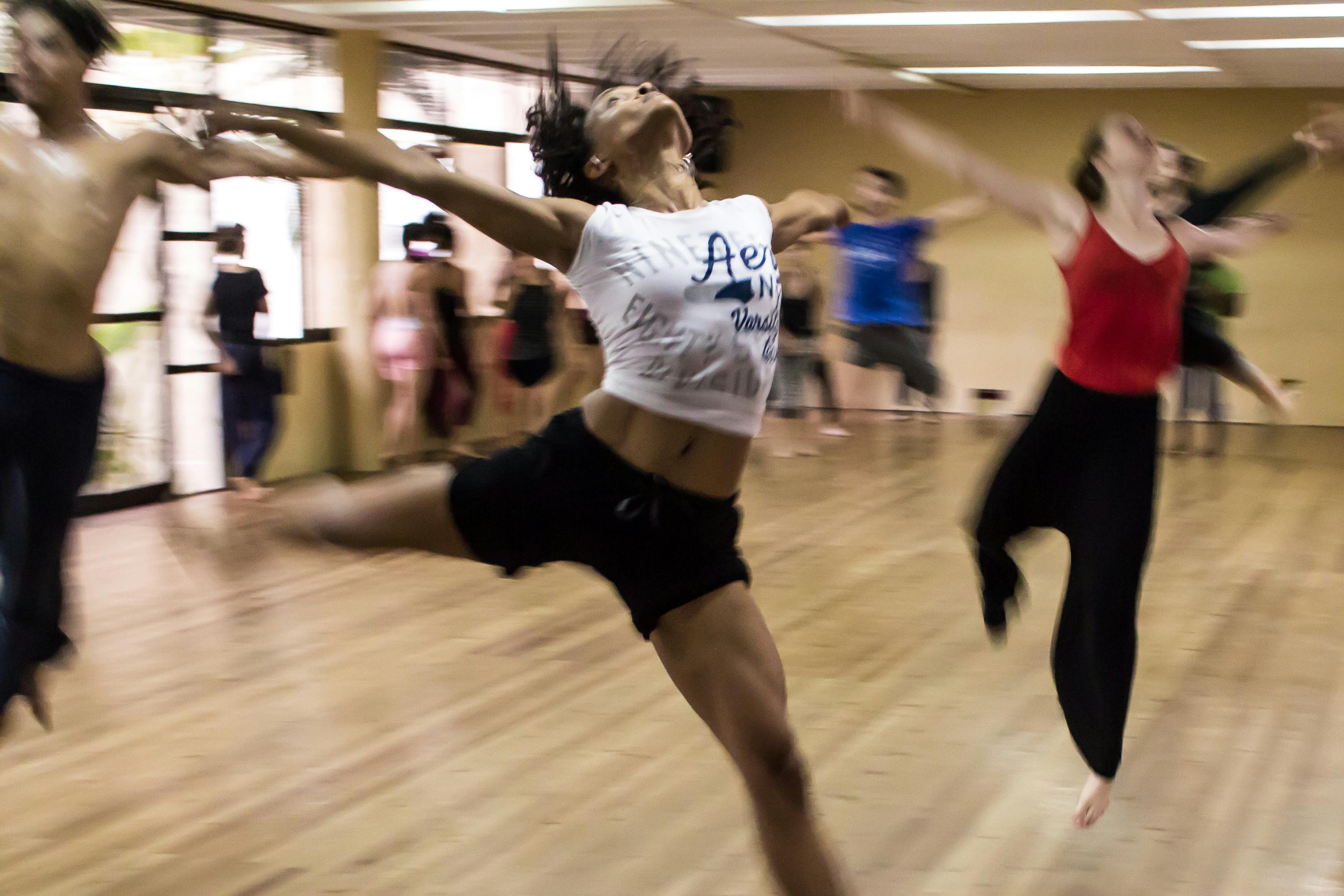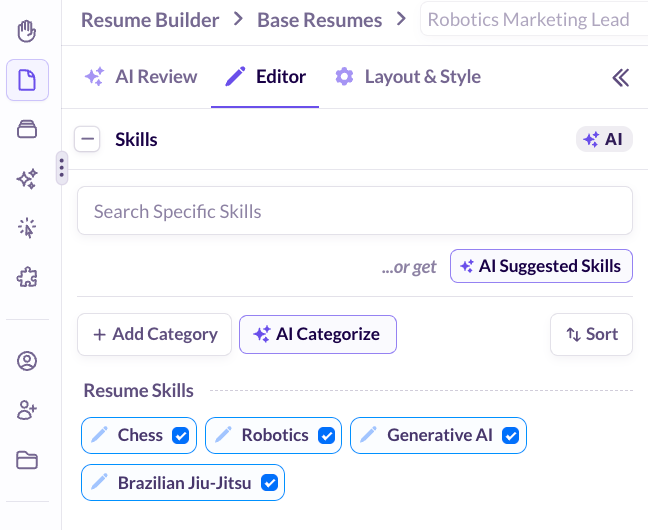Huntr Blog
400+ Hobbies and Interests to Put on a Resume (Examples)
August 21, 2025
The best way to stand out on a resume beyond showcasing some epic experience is to give the hiring manager a glimpse into your world. Whether it’s showcasing some hobbies you’ve taken up and mastered or showing interests that showcase unique skill sets, having hobbies and interests on a resume could be valuable. Of course, your work experience is more valuable than the things you do for fun, but they do share insights into what kind of person you are, your dedication to mastery, and more. This article is going to give you a deep dive into when to include hobbies and interests on a resume, which type are best to include, the best niches for hobbies on a resume, and includes lists of hobbies based on common skills and job titles.
Working on your resume?
Sign up for Huntr to generate relevant skills, bullet points, and more with AI. All it takes is a couple of clicks.
Should you put hobbies on a resume?
It depends. Adding hobbies to a resume isn’t always ideal. For some professions, it’s more formal and serious to hire a candidate, and it’s less about personality and more about whether or not you can do the job. Hobbies on a resume might also introduce some bias. For example, if your resume includes a bunch of thrill-seeking hobbies and you’re applying for a job at a boring bank, a bank hiring manager might think you’d get bored at the job. The type of work you do needs to line up with the hobbies and interests on a resume so it showcases that you’re a good fit for the job.

When to include hobbies and interests on a resume
When it’s relevant to the job
Adding hobbies and interests to a resume makes sense when it’s relevant to the job you’re applying for. A nurse who exercises and practices healthy eating will likely set better examples for her patients. So, if it’s relevant, it can create a positive bias for you. However, if your hobbies include racing and you’re a mechanic, you might be at risk of injury, which may put you at a disadvantage. You know, unless you’re applying to be a mechanic for a racing team.
When it shows culture fit
Adding hobbies and interests on a resume is a good idea when it shows culture fit. For example, if you’re applying for an entrepreneurship company, showcasing your entrepreneurial spirit is a good idea. However, if your hobbies include political activism at a neutral company, it may be seen as a distraction.
When you lack professional experience
When you lack professional experience, you can include hobbies and interests to pad out your resume. This can help you add relevant interests and hobbies that may increase your chances of landing a role as an early employee, such as a new graduate.
When you need to fill an employment gap
When you’ve recently been laid off from a job, you’ve been out of work for a while, or you chose to take a leave of absence for medical or parental purposes, you might find filling an employment gap is necessary. You might add hobbies and interests on a resume to showcase that you’re aligned with what the role is about, while showcasing yourself as an ideal candidate despite the small employment gap.
When you need to stand out
When you know a specific job is ultra competitive and you need to stand out to differentiate yourself from other candidates, you can add hobbies and interests to showcase your uniqueness.
When you want to demonstrate unique skills
Every hobby and interest requires a different set of skills. If you’re trying to showcase your unique skill set through your hobbies and interests, you’ll be able to differentiate yourself while still showing others that you have developed those unique skills through what you’ve done.
When applying for creative roles
It’s not uncommon for creative roles like graphic design, writing, marketing, and entrepreneurship to find creatives who have hobbies within their craft. A writer who writes novels for fun could include her interests on a resume, and it’s a good fit. An entrepreneurial person putting their side hustle on a resume could help them land a job.

Which type of hobbies are best to include on a resume
Relevant skills
The best hobbies and interests to put on a resume are those that align with your skills. For example, if a job posting asks for someone with presentation skills, you might put public speaking, Toastmasters, improv club, tutoring, podcasting, and debate club.
Relevant to craft
When deciding which hobbies and interests to put on a resume, consider choosing hobbies and interests that align with your craft. For example, a writer applying for a job might put hobbies and interests, such as blogging, novel writing, content marketing, scriptwriting, poetry, creative writing, and so on.
Relevant to industry
When choosing hobbies and interests to put on a resume, you might choose things that are related to your industry. For example, if you work in tech, you might mention AI, robotics, programming, 3D printing, building things, entrepreneurship, and more.
Best hobbies niches to put on a resume
Community focus
Those who are community-minded and like helping the people around them can put community-focused hobbies and interests on their resume. For example, volunteering, philanthropy, book clubs, community gardening, bowling, and so on.
Creativity minded
Those in creative industries can put more creative-minded hobbies and interests on their resume. For example, drawing, writing, photography, pottery, dance, woodworking, sewing, or cooking.
Multicultural interests
Those in diversity and inclusion-focused roles or companies might list some multicultural hobbies and interests. For example, learning languages, traveling, folk dancing, networking, and so on.
Intellectual pursuits
Those who like intellectual stimulation might find themselves including intellectual pursuits on their resume. For example, reading, learning new skills, playing an instrument, chess, jiu-jitsu, crossword puzzles, and so on.
Professional affiliations
In some industries, there are professional affiliations that you can sign up for to connect to your work community. For example, human resources, public relations, engineering, and so on have professional affiliations.
The difference between hobbies and interests on a resume
The difference between hobbies and interests is that interests might include things you consume content for, like learning about, or enjoy passively. However, hobbies are something you actively pursue and do. If you like watching social media videos about making money online, that’s an interest. However, if you like playing tennis and actively play multiple times a week, that’s a hobby.
Is it better to put hobbies, interests, or skills on a resume?
You can put hobbies, interests, and skills on a resume. Skills are the best thing to put on a resume. However, hobbies showcase that you develop skills through your regular activities. Interests showcase that you like learning new things. Ultimately, whether you’re adding hobbies, interests, or skills to a resume, it should help you pass filters by having the right keywords on your resume, but also showcase your unique personality to give you a competitive edge in your job search.
How to Add Hobbies and Interests to Your Resume
You can use Huntr to add hobbies and interests to your resume. Using Huntr's resume builder, you can find a skill section. In this skill section, you'll find a wide variety of skills that also include hobbies and interests. For most professionals, jiu-jitsu is not a traditional skill, yet you can still find it available in Huntr as you search. You can also add a category name, so if you wanted to call the skills "Hobbies" or "Interests," you could do that easily in the tool.

Best Hobbies Based on Skills
Communication Skills
- Public speaking
- Blogging or vlogging
- Debate club
- Storytelling
- Learning a new language
Teamwork Skills
- Participating in team sports
- Volunteering for community projects
- Playing multiplayer video games
- Joining a book club
- Organizing group travel or events
Problem-Solving Skills
- Puzzles (crosswords, Wordle, Sudoku)
- Escape room challenges
- Coding or programming
- Strategy board games (e.g., chess)
- DIY projects or repairs
Time Management Skills
- Planning and hosting events
- Using productivity apps
- Maintaining a personal journal or planner
- Practicing mindfulness or meditation
- Gardening or maintaining a home
Adaptability Skills
- Traveling to new places
- Learning new activities
- Attending workshops or seminars
- Learning new technologies or tools
- Engaging in improv theater
Creativity Skills
- Painting or drawing
- Creative writing
- Crafting (e.g., knitting, scrapbooking)
- Playing a musical instrument
- Cooking or baking new recipes
Work Ethic
- Long-distance running or endurance sports
- Joining a study group or academic club
- Learning a new skill or subject
- Practicing a disciplined hobby (e.g., martial arts)
- Participating in charity or volunteer work
Interpersonal Skills
- Networking events
- Hosting social gatherings
- Presenting in philanthropy groups
- Engaging in active listening exercises
- Joining social clubs or organizations
Leadership Skills
- Leading a sports team
- Organizing community events
- Mentoring or coaching
- Taking leadership roles in clubs or organizations
- Participating in leadership training programs
Attention to Detail
- Model building or miniature painting
- Photography
- Editing or proofreading
- Collecting (e.g., stamps, coins)
- Playing musical instruments that require precision
Emotional Intelligence
- Practicing active listening
- Journaling about emotions
- Meditation or yoga
- Reading books on psychology or self-improvement
- Volunteering for support groups
Negotiation Skills
- Playing negotiation games (e.g., Monopoly)
- Role-playing exercises
- Participating in debate clubs
- Practicing conflict resolution scenarios
- Learning about different cultures and perspectives
Conflict Resolution Skills
- Mediation training
- Studying psychology or counseling techniques
- Role-playing conflicts and resolutions
- Participating in collaborative projects
- Volunteering for community mediation programs
Stress Management Skills
- Practicing yoga or meditation
- Engaging in regular exercise
- Pursuing hobbies that induce flow (e.g., painting, playing music)
- Spending time in nature
- Learning and practicing relaxation techniques
Networking Skills
- Attending industry conferences
- Joining professional associations
- Participating in social media groups
- Organizing meetups or networking events
- Volunteering for community events
Decision-Making Skills
- Playing strategic games (e.g., Risk, chess)
- Scenario planning exercises
- Participating in escape rooms
- Learning about decision-making models
- Analyzing case studies
Critical Thinking Skills
- Reading and discussing non-fiction books
- Engaging in philosophical debates
- Solving logic puzzles
- Learning a new language or coding
- Analyzing current events and news
Customer Service Skills
- Volunteering in customer-facing roles
- Participating in role-playing exercises
- Working in retail or service industries
- Joining a hospitality club or association
- Taking courses on communication and empathy
Presentation Skills
- Practicing public speaking
- Joining Toastmasters
- Participating in drama or theater
- Creating and delivering presentations for clubs
- Recording and reviewing video presentations
Self-Motivation Skills
- Setting and achieving personal goals
- Learning new skills independently
- Participating in self-improvement workshops
- Engaging in solo sports or activities
- Maintaining a personal blog or journal
Hobbies and Interests to Put on a Resume by Industry
Technology & IT
- Coding personal projects or apps
- Contributing to open-source software
- Building PCs or tinkering with hardware
- Attending hackathons or tech meetups
- Exploring AI, VR, or blockchain projects
Finance & Consulting
- Stock market simulations or trading clubs
- Case study competitions
- Playing chess or other strategy games
- Economics or finance book clubs
- Mentorship in financial literacy programs
Healthcare & Life Sciences
- Volunteering at health clinics or blood drives
- Practicing mindfulness or yoga
- Running or participating in fitness events
- Health/wellness blogging
- Cooking nutritious meals or meal-prep planning
Education & Training
- Tutoring or mentoring students
- Language learning or cultural exchange groups
- Creating educational YouTube or TikTok content
- Reading clubs and literary groups
- Designing lesson plans for nonprofits
Creative Industries
- Photography or videography
- Blogging or podcasting
- Graphic design as a side project
- Performing arts (acting, improv, music)
- Street art, murals, or digital illustration
Engineering & Manufacturing
- Robotics clubs or competitions
- 3D printing or CAD modeling
- DIY home repair projects
- Car restoration or modification
- Model building (drones, trains, planes)
Legal & Policy
- Debate clubs or moot court
- Writing thought pieces on law/policy
- Community advocacy groups
- Volunteering with legal aid organizations
- Following politics/current affairs forums
Hospitality & Tourism
- Culinary arts (cooking, baking, mixology)
- Travel blogging or photography
- Language learning for travel
- Organizing cultural exchange events
- Event planning for community groups
Sales & Business Development
- Networking clubs or chambers of commerce
- Toastmasters or public speaking groups
- Competitive sports (showing drive and persistence)
- Entrepreneurship or side hustles
- Blogging about business trends
Environmental & Sustainability
- Hiking, camping, or nature exploration
- Gardening or urban farming
- Volunteering for environmental causes
- DIY upcycling or eco-crafts
- Advocacy in climate action groups
Best Hobbies Based on Job Titles
Software Developer
- Coding or programming side projects
- Participating in hackathons
- Building and tinkering with electronics
- Contributing to open-source projects
- Playing strategic video games
Project Manager
- Planning and hosting events
- Participating in strategic board games
- Volunteering for community projects
- Learning new project management methodologies
- Engaging in DIY home improvement projects
Graphic Designer
- Drawing or sketching
- Photography
- Visiting art galleries and museums
- Creating digital art
- Participating in design challenges
Marketing Manager
- Blogging or content creation
- Studying market trends and consumer behavior
- Networking at industry events
- Participating in social media campaigns
- Volunteering for community marketing projects
Sales Representative
- Networking and attending social events
- Reading books on sales techniques
- Practicing public speaking
- Participating in competitive sports
- Engaging in role-playing sales scenarios
Human Resources Specialist
- Volunteering for community support groups
- Participating in workshops on empathy and communication
- Reading about labor laws and workplace culture
- Organizing team-building activities
- Mentoring or coaching others
Financial Analyst
- Studying stock market trends
- Playing strategy-based board games
- Analyzing financial news and reports
- Participating in investment clubs
- Engaging in personal budgeting and finance management
Teacher
- Volunteering for educational programs
- Reading and discussing educational theories
- Creating educational materials
- Engaging in public speaking
- Participating in community theater or drama clubs
Administrative Assistant
- Organizing events and gatherings
- Practicing mindfulness and organization techniques
- Learning new office software
- Volunteering for administrative roles in community projects
- Engaging in journaling or planning
Nurse
- Volunteering in healthcare settings
- Participating in first aid training
- Practicing mindfulness and self-care
- Learning about nutrition and wellness
- Engaging in physical fitness activities
Mechanical Engineer
- Building and repairing mechanical devices
- Participating in robotics clubs
- Engaging in DIY home improvement projects
- Flying model airplanes or drones
- Studying automotive mechanics
Data Analyst
- Analyzing data sets for personal projects
- Participating in data science competitions
- Reading about statistical methods and trends
- Learning new programming languages
- Engaging in puzzles and logic games
Content Writer
- Blogging or journaling
- Participating in writing workshops
- Reading a wide range of literature
- Engaging in storytelling or creative writing
- Volunteering to write for community newsletters
Customer Service Representative
- Volunteering in customer-facing roles
- Participating in role-playing exercises
- Learning about communication and empathy techniques
- Engaging in active listening exercises
- Practicing public speaking
Accountant
- Managing personal or family budgets
- Participating in financial literacy workshops
- Studying tax laws and regulations
- Engaging in puzzles and logic games
- Volunteering for community finance roles
Architect
- Visiting architectural landmarks
- Sketching and drawing
- Participating in model building
- Studying architectural styles and history
- Engaging in photography
Operations Manager
- Planning and organizing events
- Participating in strategy-based board games
- Volunteering for logistics roles in community projects
- Learning about new operational methodologies
- Engaging in DIY home improvement projects
Web Developer
- Building personal or freelance websites
- Participating in coding challenges
- Contributing to open-source projects
- Learning new web development languages
- Engaging in gaming or tech forums
Public Relations Specialist
- Networking at social events
- Writing press releases or blog posts
- Studying media trends and communication strategies
- Participating in public speaking or debate clubs
- Volunteering for community PR projects
Human Resources Manager
- Volunteering for mentorship programs
- Participating in workshops on leadership and communication
- Reading about workplace culture and employee engagement
- Organizing team-building activities
- Networking at industry events
Best Hobbies and Interests to Put on a Resume by Personality
Analytical Thinkers
- Chess and strategy board games
- Coding personal or open-source projects
- Data competitions (Kaggle, analytics challenges)
- Sudoku and logic puzzles
- Competitive gaming (strategy-focused)
Creative Innovators
- Graphic design or digital illustration
- Photography and videography
- Creative writing or blogging
- Podcast production
- Filmmaking (short films, editing projects)
Social Connectors
- Team sports (soccer, basketball, volleyball)
- Volunteering in group initiatives
- Organizing community or networking events
- Theater or improv performance
- Toastmasters or public speaking clubs
Independent Doers
- Long-distance running or cycling
- DIY projects (home improvement, furniture building)
- Solo travel (cultural immersion, language practice)
- Independent research/writing projects
- Learning new skills through online courses
Detail-Oriented Planners
- Baking or pastry creation (requires precision)
- Model building (engineering kits, Lego architecture)
- Organizing fundraisers or charity events
- Event planning for local groups
- Financial budgeting projects (personal finance clubs)
Resilient Achievers
- Marathon or triathlon training
- Martial arts
- Rock climbing or mountaineering
- CrossFit or structured fitness training
- Learning advanced new skills (languages, instruments)
Empathetic Helpers
- Volunteering at nonprofits or shelters
- Mentoring or tutoring students
- Fundraising for social causes
- Animal fostering or rescue group involvement
- Crisis line or community support roles
Strategic Leaders
- Coaching sports teams
- Leading alumni or student associations
- Organizing hackathons or startup weekends
- Serving on nonprofit or community boards
- Political or advocacy organizing (professional focus)
Adventurous Explorers
- International travel with language immersion
- Scuba diving or sailing (structured certification-based hobbies)
- Cultural cooking (documented experiences/blogs)
- Adventure sports with achievement (climbing certifications, guided treks)
- Travel photography with published or portfolio work
Lifelong Learners
- Reading and book clubs (professional/industry-relevant)
- Online courses (MOOCs, certifications)
- Attending lectures, conferences, or workshops
- Language learning (structured courses, exchange groups)
- Experimenting with professional skill-based hobbies (woodworking, coding bootcamps)
Get More Interviews, Faster
Huntr streamlines your job search. Instantly craft tailored resumes and cover letters, fill out application forms with a single click, effortlessly keep your job hunt organized, and much more...
AI Resume Builder
Beautiful, perfectly job-tailored resumes designed to make you stand out, built 10x faster with the power of AI.
Next-Generation Job Tailored Resumes
Huntr provides the most advanced job <> resume matching system in the world. Helping you match not only keywords, but responsibilities and qualifications from a job, into your resume.
Job Keyword Extractor + Resume AI Integration
Huntr extracts keywords from job descriptions and helps you integrate them into your resume using the power of AI.
Application Autofill
Save hours of mindless form filling. Use our chrome extension to fill application forms with a single click.
Job Tracker
Move beyond basic, bare-bones job trackers. Elevate your search with Huntr's all-in-one, feature-rich management platform.
AI Cover Letters
Perfectly tailored cover letters, in seconds! Our cover letter generator blends your unique background with the job's specific requirements, resulting in unique, standout cover letters.
Resume Checker
Huntr checks your resume for spelling, length, impactful use of metrics, repetition and more, ensuring your resume gets noticed by employers.
Gorgeous Resume Templates
Stand out with one of 7 designer-grade templates. Whether you're a creative spirit or a corporate professional, our range of templates caters to every career aspiration.
Personal Job Search CRM
The ultimate companion for managing your professional job-search contacts and organizing your job search outreach.

